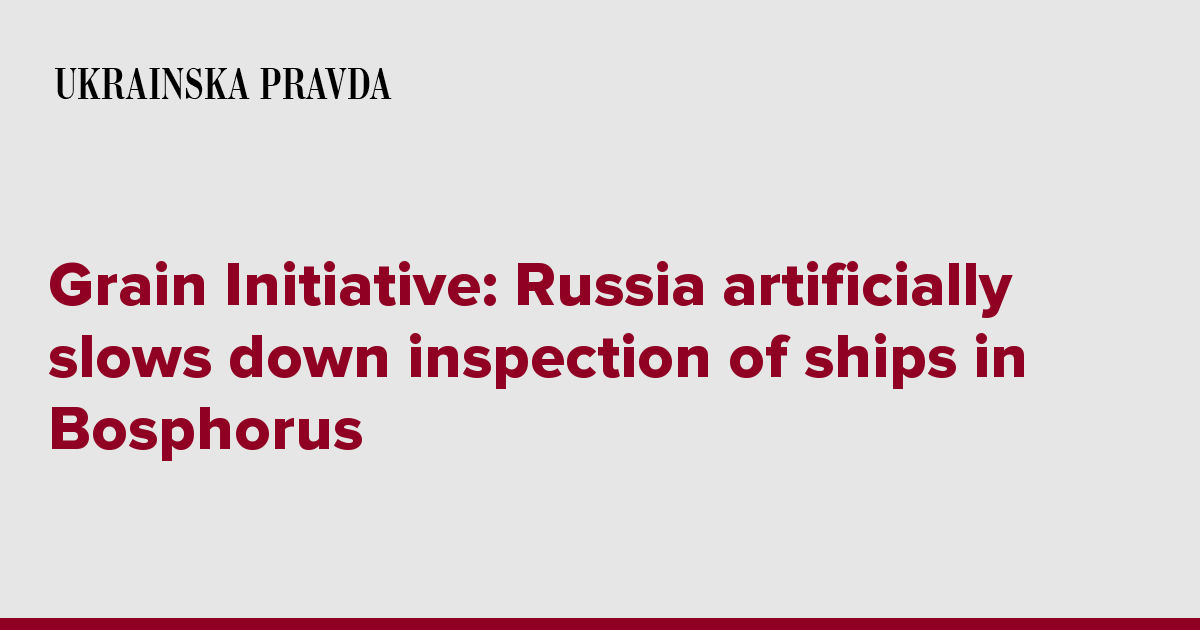Grain Initiative: Russia artificially slows down inspection of ships in Bosphorus

Since October, Russia has been purposefully sabotaging the inspection of ships in the Bosphorus as part of the Black Sea Grain Initiative, resulting in a consistently large queue of more than 100 ships. Source: statement by the Ministry of Infrastructure of Ukraine Details: The Ministry states that 17.8 million tonnes of Ukrainian agricultural products on 659 vessels have been exported from the ports of the Great Odesa [Odesa agglomeration] (Odesa, Chornomorsk, and Pivdennyi ports) to 40 countries since 1 August 2022.
Since the grain deal was agreed, three ports had sent 659 ships with food to Africa, Asia, and Europe, and received 643 new ones to be loaded with products from Ukrainian farmers. "If the corridor had functioned fully, Ukraine would have exported at least 25-29 million tonnes of foods to world markets. Thus, since October, Ukrainian ports have been forced to work at half their capacity, the volume of the fleet entering the ports for loading has decreased, and the volume of exports has decreased by three million tonnes per month.
The main reason is the purposeful sabotage of inspections of ships in the Bosporus by the Russian side, which leads to a consistently long queue of more than 100 ships," the Ministry emphasised.
"Starting from October 2022, the Russian delegation to the Joint Coordination Center (JCC) began to artificially slow down the ship inspection process. First, as soon as the volume of exports began to grow, the Russian side reduced the number of inspection teams from five to three without any explanation. Secondly, the time for inspections is artificially increased by checking the performance of vessels, which is not regulated by the JCC documents and has nothing to do with the grain agreement.
Thus, it takes more than four hours to check one vessel, so only 5-7 inspections are carried out per day, with the minimum required 16-18. There are cases when Russians refuse to work for fictitious reasons when all other parties in the JCC confirm the conditions for continuing the inspection," explained Ruslan Sahautdinov, Ukraine representative at the JCC. "The problem is solved by increasing the number of inspection teams and the number of inspections per day.
We have repeatedly appealed to our partners and they are ready for this. In November, when more than 200 vessels were waiting in the Bosporus, the UN and Turkey independently conducted 86 inspections in two days and proved that it is quite realistic," he added.
We have launched English Twitter! Follow us!
Thus, as of 18 January, 121 ships are awaiting inspection by the JCC in the Bosphorus (28 with agricultural products on board, 93 ships going to ports for loading).
The average waiting time is 2 to 5 weeks, which also leads to millions of losses for cargo owners. The queue has been observed since November 2022, emphasises the Ministry of Infrastructure. This affected the export volumes.
Thus, ports exported 47% less agricultural products in November than in October, when these problems began. In October, Ukraine exported 2 tonnes of foodstuff less than it could, and in November and December, this figure increased to 3 tonnes per month. Background:
On 22 July 2022, in Istanbul, Ukraine, Turkey and UN Secretary General Antonio Guterres signed the Initiative on the safe transportation of grain and food products from the Ukrainian ports of Odesa, Chornomorsk and Pivdennyi - at the suggestion of the UN.
The Grain Initiative made it possible to unblock the ports of the Great Odesa, which before the war were 80% [of all] gateways for agricultural exports; to support Ukrainian farmers, increase foreign exchange revenue to Ukraine, stabilise world food prices, and prevent a significant deterioration of the humanitarian situation in the states that are on the brink of famine, particularly in Ethiopia, Somalia, and Afghanistan," the Ukrainian ministry added.
Journalists fight on their own frontline. Support Ukrainska Pravda or become our patron!